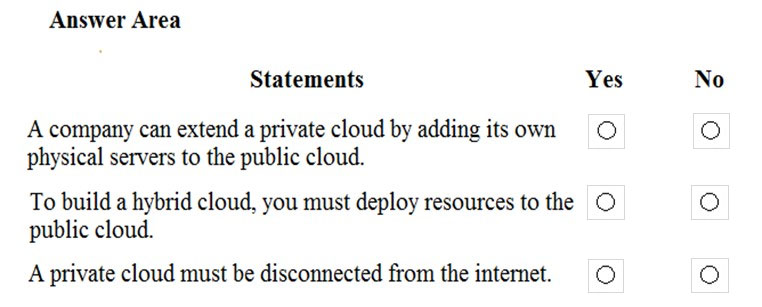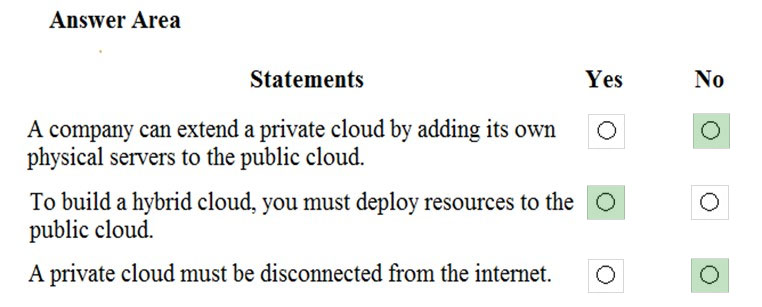HOTSPOT -
For each of the following statements, select Yes if the statement is true. Otherwise, select No.
NOTE: Each correct selection is worth one point.
Hot Area:

HOTSPOT -
For each of the following statements, select Yes if the statement is true. Otherwise, select No.
NOTE: Each correct selection is worth one point.
Hot Area:


Box 1: No -
You cannot add physical servers to the public cloud. You can only deploy virtual servers in the public cloud. You can extend a private cloud by deploying virtual servers in a public cloud. This would create a hybrid cloud.
Box 2: Yes -
A hybrid cloud is a combination of a private cloud and public cloud. Therefore, to create a hybrid cloud, you must deploy resources to a public cloud.
Box 3: No.
It is not true that a private cloud must be disconnected from the Internet. Private clouds can be and most commonly are connected to the Internet. ג€Private cloudג€ means that the physical servers are managed by you. It does not mean that it is disconnected from the Internet.
Reference:
https://azure.microsoft.com/en-gb/overview/what-are-private-public-hybrid-clouds/
I think, no, no, no
I think you are right
I agree. You wouldn't be deploying 'Resources' to public cloud. Public cloud already have resources such as Servers, OS. You would be deploying only your code and data.
You deploy resources (VMs, DBs, Network Components)to public cloud.
Agree, you can build a hybrid cloud starting by a public cloud and then deploying ressources to private cloud, I think it came up in a previous version.
from your argument you need deploy resources in cloud so how you agree with NNN?
Not sure about answer 2. You can deploy resources to private cloud as well in case of hybrid, why MUST deploy to public cloud only?
I don't see the word "only".
must in the sentence takes the place of only
no, "must" means you have to, because you have to have something in the cloud, it does not mean "only"
In case the user Already had Public Cloud only, then if he prepares on-premises servers or Private Cloud, they would be Hybrid. So...I think No/No/No in this question.
2nd - Tricky one - Still not sure. If you already have public cloud and adding on-prem resources making it hybrid - Answer is No. But you still need to connect somehow your public and private cloud - i.e. VPN or direct MPLS. That connection is also an resource. With that in mind the answer is Yes you still need at least some "connection" resource to be deployed in Public cloud. What do you think ?
In hybrid you deploy to both public and private cloud. It doesn't say ONLY public but you have to have something deployed in public cloud, otherwise it's just private cloud not hybrid
This is the best answer for me, the word 'ONLY' is the key. If it was there in the sentence, so it would be false, otherwise is is true.
correct. If you don't have anything in public cloud but just in on prem then it is not hybrid. So you will need to deploy vm or an app, website (anything) in public clod to make it hybrid.
what if you already have one deployed on a public cloud, and you want to deploy another? In this case, it's already hybrid anyway, so I can deploy either in the private or public.
I agree. My assumption based on the statement is that there is no private cloud yet. So it won't be a hybrid if this is deployed only in the public cloud.
A hybrid cloud is a computing environment that uses both public and private clouds in an inter-connected environment. A hybrid cloud environment can be used to allow a private cloud to surge for increased, temporary demand by deploying public cloud resources. Hybrid cloud can be used to provide an extra layer of security. For example, users can flexibly choose which services to keep in public cloud and which to deploy to their private cloud infrastructure. https://learn.microsoft.com/en-us/training/modules/describe-cloud-compute/5-define-cloud-models A hybrid cloud MUST have a public cloud and a private cloud (either on-premises or off-premises)
Where the hell people read word "only" in question two , and how you get a hybrid model without deploy nothing at cloud , common.
On Exam Jun/24
what happened about your exam how was it
first answer should be yes. Private can use VPN to connect to its servers deployed on cloud
This was on exam. 9/30/23
I think No/No/No in this question.
Correct answers are: No, Yes, No.
No, Yes, No
For scenario 2: To make use of the SaaS model of Azure cloud using 0365, M365, or Dynamics365, would not require you deploying any "resource" in the public cloud. You only bring your data. So, if you already have a Private cloud in addition to the above scenario, you'd have an Hybrid cloud (essentially without having deployed any Azure resource). The caveat is: you would still have to make use of some Azure services though.
I guess Q2 is NO. There are three different ways to deploy cloud services: on a public cloud, private cloud, or hybrid cloud. Which deployment method depends on your business needs. Source :https://azure.microsoft.com/en-us/resources/cloud-computing-dictionary/what-are-private-public-hybrid-clouds.
Ok, I can have a hybrid cloud with private local network and private cloud, leaving the public cloud out of the picture. With other words - public cloud is not a must for hybrid cloud. Is that correct?
I don't undestand why you're those folks yelling here that the question appeared in exam without revealing if you answered correctly, especially when seeing that there's a confusion in the discussion :(
Answer:- NNN
I understand "deploy resources" as deploying physical Hardware. Otherwise (using the azure term resource) i´d say "create resource". Hence NNN
Got it on 02012024 Exam
according to microsoft: 'A hybrid cloud is a type of cloud computing that combines on-premises infrastructure—or a private cloud—with a public cloud' So imo to have a hybrid cloud you must also have a public cloud ref: https://azure.microsoft.com/en-us/resources/cloud-computing-dictionary/what-are-private-public-hybrid-clouds